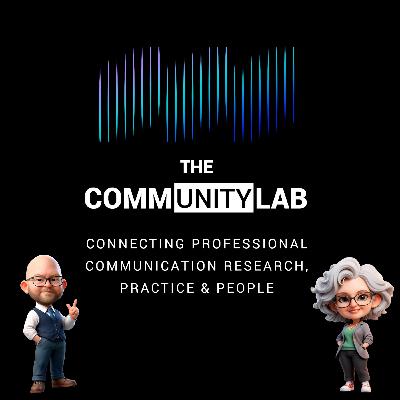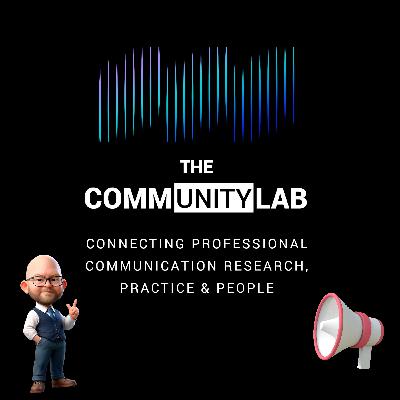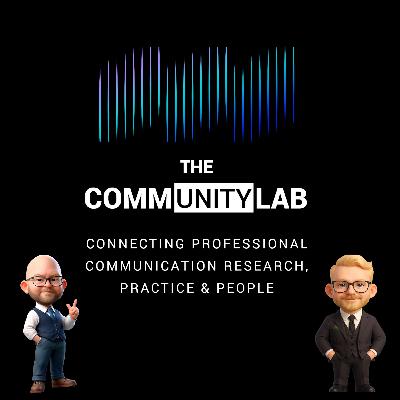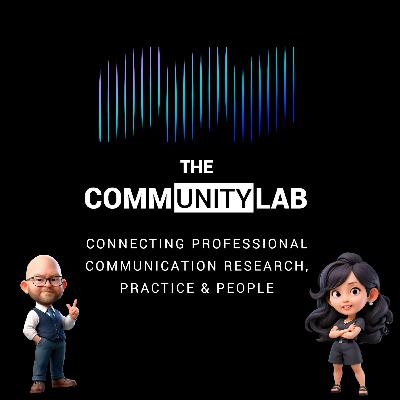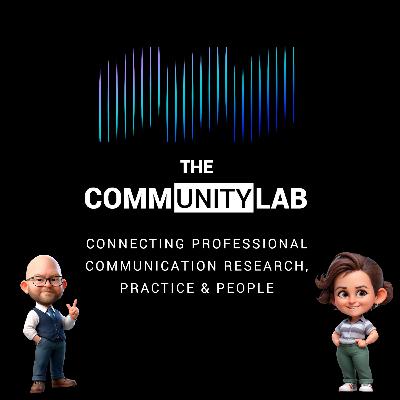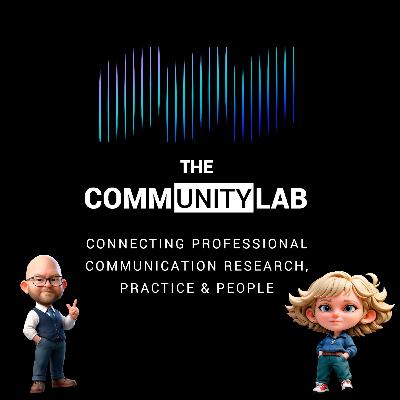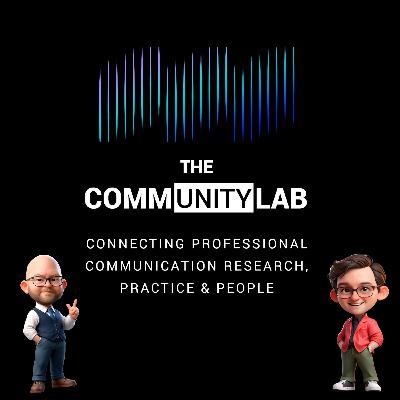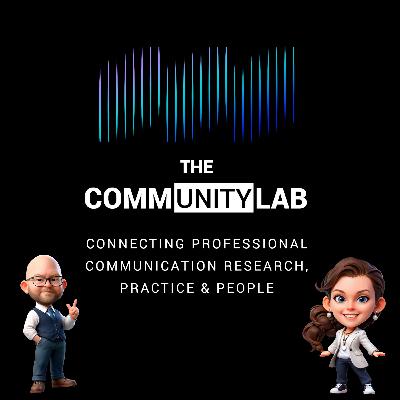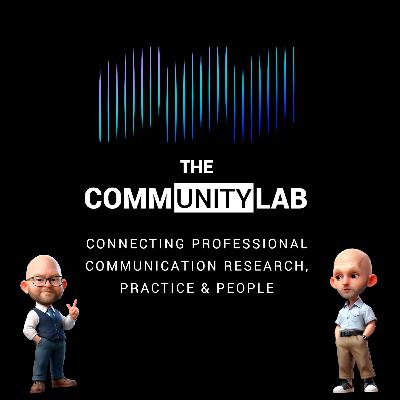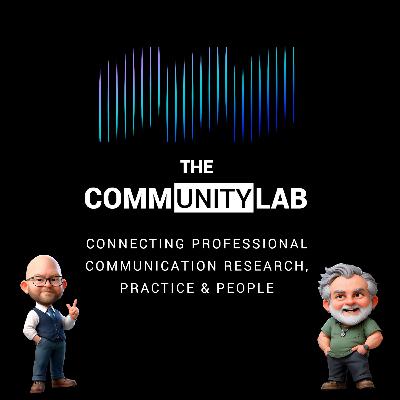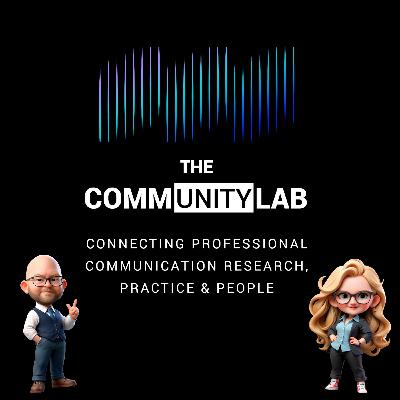Discover The CommUnity Lab - Connecting Professional Communication Research, Practice & People
The CommUnity Lab - Connecting Professional Communication Research, Practice & People

The CommUnity Lab - Connecting Professional Communication Research, Practice & People
Author: Daniel Wolfgruber
Subscribed: 0Played: 2Subscribe
Share
Description
Welcome to the CommUnity Lab Podcast!
Dive into the fascinating world of professional communication research and its application with host Danny, an enthusiastic communication and management scholar at HEC Montréal, Canada.
Through insightful and personal conversations with renowned academic experts, we explore varying topics in the realm of professional communication, such as organizational, internal, and leadership communication, PR, CSR, or DEI communication. Whether you're a practitioner, student, or curious mind, join us for thought-provoking "Lab Talks" that blend academic communication research with practical applications — served with a touch of humor and a passion for knowledge transfer and connection.
Dive into the fascinating world of professional communication research and its application with host Danny, an enthusiastic communication and management scholar at HEC Montréal, Canada.
Through insightful and personal conversations with renowned academic experts, we explore varying topics in the realm of professional communication, such as organizational, internal, and leadership communication, PR, CSR, or DEI communication. Whether you're a practitioner, student, or curious mind, join us for thought-provoking "Lab Talks" that blend academic communication research with practical applications — served with a touch of humor and a passion for knowledge transfer and connection.
14 Episodes
Reverse
Welcome to The CommUnity Lab! The knowledge transfer podcast, where we dive deep into the fascinating world of professional communication research and its application. Hosted by Danny (Daniel Wolfgruber), this podcast brings together leading scholars to explore how communication shapes workplaces, relationships, and society at large.
Today’s guest is Tomi Laapotti from the University of Vaasa, Finland. In this Lab Talk, we explore the role of artificial intelligence in organizational communication and everyday work practices. Together, we unpack what artificial intelligence actually is, how Generative AI and Large Language Models differ from other forms of AI, and why algorithms are not just tools but active participants in organizing. Drawing on recent research, Tomi discusses ripple effects of human–AI interaction in the workplace, the risks and biases hidden in AI “black boxes,” and what all this means for communication professionals and leaders alike. A timely conversation for anyone navigating work, organizing, and communication in general, in an increasingly algorithmic world.
Want to explore more? Here are five scientific publications related to today’s episode:
Alaimo, C., & Kallinikos, J. (2021). Organizations decentered: Data objects, technology and knowledge. Organization Science, 33(1), 19-37. https://doi.org/10.1287/orsc.2021.1552
Einola, K., & Khoreva, V. (2022). Best friend or broken tool? Exploring the co-existence of humans and artificial intelligence in the workplace ecosystem. Human Resource Management, 62(1), 117-135. https://doi.org/10.1002/hrm.22147.
Hicks, M. T., Humphries, J., & Slater, J. (2024). ChatGPT is bullshit. Ethics and Information Technology 26, 38. https://doi.org/10.1007/s10676-024-09775-5.
Laapotti, T. & Raappana, M. (2022). Algorithms and organizing. Human Communication Research, 48(3), 491–515. https://doi.org/10.1093/hcr/hqac013
Pelevina, N.-M., Sihvonen, T., Rousi, R., Laapotti, T., & Mikkola, H. (2025). Finlandised electobots and the distortion of collective political memory. Memory, Mind & Media, 4, e26. https://doi.org/10.1017/mem.2025.10022
Follow The CommUnity Lab on Spotify and Apple Podcasts, subscribe on YouTube, and join the conversation on LinkedIn. You can also send us an email to communitylab.podcast@gmail.com. Your feedback and suggestions help shape this podcast into a must-listen for all communication enthusiasts.
Let’s decode the way we (try to) connect, one conversation at a time!
Welcome to The CommUnity Lab! The knowledge transfer podcast, where we dive deep into the fascinating world of professional communication research and its application. Hosted by Danny (Daniel Wolfgruber), this podcast brings together leading scholars to explore how communication shapes workplaces, relationships, and society at large.
Today’s guest is Prof. Nancy Bell from Washington State University. In this Lab Talk, we dive into the fascinating world of humor, especially the moments when a joke doesn’t land. Together, we explore how and why humor fails in everyday interactions at work, in the classroom, and at home. Drawing on linguistic research, Nancy explains the roles of humor competence and humor performance, and why context and framing are crucial when you decide to crack a joke. A must-listen for anyone who wants to understand what makes humor work… and what makes it fall flat.
Want to explore more? Here are five scientific publications related to today’s episode:
Bell, N. (2015). We are not amused: Failed humor in interaction. De Gruyter. https://www.degruyterbrill.com/document/doi/10.1515/9781501501586/html
Gironzetti, E. (2022). The multimodal performance of conversational humor. John Benjamins. https://benjamins.com/catalog/ftl.13
Haugh, M. (2016). “Just kidding”: Teasing and claims to non-serious intent. Journal of Pragmatics, 95, 120-136. https://doi.org/10.1016/j.pragma.2015.12.004
Haugh, M., & Márquez Reiter, R. (2025). (Un)intended offence: Speaker meaning and discursive scales in the negotiation of offensive humour. Pragmatics & Cognition, 32(1), 8-38. https://doi.org/10.1075/pc.24019.hau
Schnurr, S., Azikin, N., & Omar, M. (2021). Leadership and humour at work: Using interactional sociolinguistics to explore the role of gender. In J. Angouri & J. Baxter (Eds.), The Routledge Handbook of Language, Gender, and Sexuality. Routledge. https://www.taylorfrancis.com/chapters/edit/10.4324/9781315514857-16/leadership-humour-work-stephanie-schnurr-azikin-mohd-omar
Follow The CommUnity Lab on Spotify and Apple Podcasts, subscribe on YouTube, and join the conversation on LinkedIn. You can also send us an email to communitylab.podcast@gmail.com. Your feedback and suggestions help shape this podcast into a must-listen for all communication enthusiasts.
Let’s decode the way we (try to) connect, one conversation at a time!
After four months of silence, The CommUnity Lab is back!
In this short bonus track, host Danny shares why the summer break lasted a little longer than planned, and what exciting conversations are coming up in the next Lab Talks, already in the making.
Follow The CommUnity Lab on Spotify, Apple Podcasts, YouTube, or wherever you get your podcasts, and join the conversation on LinkedIn. You can also reach us at communitylab.podcast@gmail.com. Your feedback helps shape this show into a must-listen for everyone passionate about communication.
Let’s decode how we (try to) connect — one conversation at a time!
Welcome to The CommUnity Lab! The knowledge transfer podcast, where we dive deep into the fascinating world of professional communication research and its application. Hosted by Danny (Daniel Wolfgruber), this podcast brings together leading scholars to explore how communication shapes workplaces, relationships, and society at large.
In each episode, we break down communication research and real-world insights, making them accessible and relevant for communication professionals, leaders, fellow scholars, students, and anyone curious about the magic of communication.
Today’s guest is Prof. Boris H.J.M. Brummans from the Université de Montréal. In this Lab Talk, we explore the concept of mindful organizing and discuss how ethnographic methods can help both researchers and practitioners better understand and improve organizational life. Boris shares insights from his own journey — including a life-altering experience in the Himalayas — and explains how Buddhist principles like interdependence and impermanence shape his thinking about communication, organizations, and society. Whether you're an academic, a practitioner, or simply curious, this episode offers a grounded and thought-provoking take on how mindfulness and method can come together.
Want to explore more? Here are five scientific publications related to today’s episode:
Brummans, B. H. J. M. (2007). Death by document: Tracing the agency of a text. Qualitative Inquiry, 13(5), 711–727. https://doi.org/10.1177/1077800407301185
Brummans, B. H. J. M. (2012). The road to Rizong: Buddhist mindful organizing amid natural disaster in the Indian Himalayas. Qualitative Communication Research, 1(4), 433–460. https://doi.org/10.1525/qcr.2012.1.4.433
Brummans, B. H. J. M. (2022). Eight ways to notice mindfully in process organization studies. In B. Simpson & L. Revsbæk (Eds.), Doing process research in organizations: Noticing differently (pp. 173–194). Oxford University Press. https://doi.org/10.1093/oso/9780192849632.003.0009
Town, S., Reina, C. S., Brummans, B. H. J. M., & Pirson, M. (2024). Humanistic organizing: The transformative force of mindful organizational communication. Academy of Management Review, 49(4), 824–847. https://doi.org/10.5465/amr.2021.0433
Varela, F. J., Thompson, E., & Rosch, E. (1991). The embodied mind: Cognitive science and human experience. MIT Press.
Follow The CommUnity Lab on Spotify, Apple Podcasts, or Podcastle, subscribe on YouTube, and join the conversation on LinkedIn. Your feedback helps shape this podcast into a must-listen for all communication enthusiasts.
Let’s decode the way we (try to) connect, one conversation at a time!
Welcome to The CommUnity Lab! The knowledge transfer podcast, where we dive deep into the fascinating world of professional communication research and its application. Hosted by Danny (Daniel Wolfgruber), this podcast brings together leading scholars to explore how communication shapes workplaces, relationships, and society at large.
In each episode, we break down communication research and real-world insights, making them accessible and relevant for communication professionals, leaders, fellow scholars, students, and anyone curious about the magic of communication.
Today’s guest is Prof. Sora Kim from the Chinese University of Hong Kong. In this Lab Talk, we dive into her research on crisis and CSR communication and explore why a crisis can also be an opportunity — if handled thoughtfully. Sora shares why credibility, culture, and stakeholder engagement are essential for reputation management in tough times, and how CSR messaging can either strengthen or severely damage an organization’s standing when the pressure is on.
Want to explore more? Here are five scientific publications related to today’s episode:
Jaques, T. (2009). Issue and crisis management: Quicksand in the definitional landscape. Public Relations Review, 35(3), 280–286. https://doi.org/10.1016/j.pubrev.2009.03.003
Ji. Y., & Kim, S. (2023). The impacts of social media bandwagon cues on public demand for regulatory intervention during corporate crises. Journal of Contingencies and Crisis Management, 31(3), 392-405. https://doi.org/10.1111/1468-5973.12446
Kim, S., Sheng, X., & Ketron, S.C. (2022). The roles of legacy versus social media information seeking in American and Chinese consumers’ hoarding during COVID-19. Journal of International Marketing, 30(2), 38-55. https://doi.org/10.1177/1069031X221089347
Kim, S., Sung, K-H., Ji, Y., Xing, C., & Qu, J. (2021). Online firestorms in social media: Comparative research between China Weibo and USA Twitter. Public Relations Review, 47(1), 102010. https://doi.org/10.1016/j.pubrev.2021.102010
Yang, C.Y., & Kim, S. (2024). Safety nudged or empowerment fueled? Leadership mechanism and boundary condition for followers’ adaptive communication behaviors during the COVID-19 pandemic crisis in China. Journal of Public Relations Research, 37(1-2), 31-53. https://doi.org/10.1080/1062726X.2024.2369643
Follow The CommUnity Lab on Spotify, Apple Podcasts, or Podcastle, subscribe on YouTube, and join the conversation on LinkedIn. Your feedback helps shape this podcast into a must-listen for all communication enthusiasts.
Let’s decode the way we (try to) connect, one conversation at a time!
Welcome to The CommUnity Lab! The knowledge transfer podcast, where we dive deep into the fascinating world of professional communication research and its application. Hosted by Danny (Daniel Wolfgruber), this podcast brings together leading scholars to explore how communication shapes workplaces, relationships, and society at large.
In each episode, we break down communication research and real-world insights, making them accessible and relevant for communication professionals, leaders, fellow scholars, students, and anyone curious about the magic of communication.
Today’s guest is Prof. Franzisca Weder from the Vienna University of Economics and Business. In this episode, we talk about her research on sustainability communication and why it matters now more than ever. Franzisca explains how organizations can and should speak about their sustainability efforts, the three key forms sustainability communication can take, and why effective, transformative public relations requires critical thinking, creativity, and the courage to question the status quo — even when it’s uncomfortable.
Want to explore more? Here are five scientific publications related to today’s episode:
Weder, F. (2024). Sustainability as guiding principle of communicative action the transformative and transformational potential of corporate sustainability communication as niche construction, a case from the energy sector. Corporate Communications: An International Journal, 30(2), 241-259. https://doi.org/10.1108/CCIJ-12-2023-0184
Weder, F. (2023). The evolution of the sustainability story: Strategic sustainability communication as niche construction. International Journal of Strategic Communication, 17(3), 228-244. https://doi.org/10.1080/1553118X.2023.2229304
Weder, F., Weaver, C.K., & Rademacher, L. (2023). Curating conversations in times of transformation: Convergence in how public relations and journalism are “Doing” communication. Public Relations Inquiry, 12(2), 163-182. https://doi.org/10.1177/2046147X231154550
Weder, F., & Milstein, T. (2021). Revolutionaries needed! Environmental communication as a transformative discipline. In B. Takahashi, J. Metag, J. Thaker, & S. Evans Comfort (Eds.), The handbook of international trends in environmental communication (pp. 407-419). Routledge.
Weder, F., Karmasin, M., Krainer, L., & Voci, D. (2021). Sustainability communication as critical perspective in media and communication studies—an introduction. In F. Weder, L. Krainer, & M. Karmasin (Eds.), The sustainability communication reader: A reflective compendium (pp. 1-12). Springer Nature.
Follow The CommUnity Lab on Spotify, Apple Podcasts, or Podcastle, subscribe on YouTube, and join the conversation on LinkedIn. Your feedback helps shape this podcast into a must-listen for all communication enthusiasts.
Let’s decode the way we (try to) connect, one conversation at a time!
Welcome to The CommUnity Lab! The knowledge transfer podcast, where we dive deep into the fascinating world of professional communication research and its application! Hosted by Danny (Daniel Wolfgruber), this podcast brings together leading scholars to explore how communication shapes workplaces, relationships, and society at large.
In each episode, we break down communication research and real-world insights, making them accessible and relevant for communication professionals, leaders, fellow scholars, students, and anyone curious about the magic of communication.
Today’s guest is Prof. Kristy Beers Fägersten from Södertörn University in Stockholm, Sweden. In this episode, we dive into her research on swearing across different contexts. Kristy explains how swearing, while often seen as socially risky, can actually strengthen social bonds, help us cope with stress in the workplace, and why leaders might want to keep the occasional swear word in their communication toolkit to make key messages land more powerfully.
Want to explore more? Here are five scientific publications related to today’s episode:
Baruch, Y., & Jenkins, S. (2007). Swearing at work and permissive leadership culture: When anti‐social becomes social and incivility is acceptable. Leadership & Organization Development Journal, 28(6), 492-507. https://doi.org/10.1108/01437730710780958
Baruch, Y., Prouska, R., Ollier-Malaterre, A., & Bunk, J. (2017). Swearing at work: The mixed outcomes of profanity. Journal of Managerial Psychology, 32(2), 149-162. https://doi.org/10.1108/JMP-04-2016-0102
Beers Fägersten, K., & Stapleton, K. (2022). Swearing. In F. Brisard, S. D’hondt, P. Gras, & M. Vandenbroucke (Eds.), Handbook of Pragmatics (pp. 129-155). John Benjamins Publishing.
Fine, A., & Corte, U. (2024). Obscenity factories: Profanity and community in workgroup cultures. Work and Occupations, 51(3), 299-324. https://doi.org/10.1177/07308884241256101
Nelson, M. (2014). ‘You need help as usual, do you?’: Joking and swearing for collegiality in a Swedish workplace. Multilingua, 33(1-2), 173-200. https://doi.org/10.1515/multi-2014-0008
Follow The CommUnity Lab on Spotify, Apple Podcasts, or Podcastle, subscribe on YouTube, and join the conversation on LinkedIn. Your feedback helps shape this podcast into a must-listen for all communication enthusiasts.
Let’s decode the way we (try to) connect, one conversation at a time!
Welcome to The CommUnity Lab! The knowledge transfer podcast, where we dive deep into the fascinating world of professional communication research and its application! Hosted by Danny (Daniel Wolfgruber), this series brings together leading scholars to explore how communication shapes workplaces, relationships, and society at large.
In each episode, we break down communication research and real-world insights, making them accessible and relevant for communication professionals, leaders, fellow scholars, students, and anyone curious about the magic of communication.
Today’s guest is Prof. Julien Mirivel from the University of Arkansas at Little Rock, USA. In this episode, we talk about his outstanding research on the power of positive communication and why, especially people in leadership positions, are well advised to interact and communicate positively across hierarchies and beyond organizational boundaries.
Want to explore more? Here are five scientific publications related to today’s episode:
Cameron, K. (2021). Positively energizing leadership: Virtuous actions and relationships that create high performance. Oakland, CA: Berrett-Koehler Publishers.
Biganeh, M., & Young, S.L. (2021). Followers’ perceptions of positive communication practices in leadership: What matters and surprisingly what does not. International Journal of Business Communication. https://doi.org/10.1177/2329488420987277
Mirivel, J.C. & Lyon, A. (2023). Positive communication for leaders: Proven strategies for inspiring unity and effecting change. Lanham, MD: Rowman & Littlefield.
Socha, T.J., & Beck, G.A. (2015). Positive communication and human needs: A review and proposed organizing conceptual framework. Review of Communication, 15(3), 173-199. https://doi.org/10.1080/15358593.2015.1080290
Socha, T.J., & Pitts, M.J. (Eds.). (2012). The positive side of interpersonal communication. New York: Peter Lang.
Starter Bibliography of the Positive Communication Network: https://docs.google.com/document/d/13dyp5p3DoPZkqcaArZcPtlXmQPT1f7oawpV8FGaSWkI/edit?tab=t.0
Follow The CommUnity Lab on Spotify, Apple Podcasts, or Podcastle, subscribe on YouTube, and join the conversation on LinkedIn. Your feedback helps shape this podcast into a must-listen for all communication enthusiasts.
Let’s decode the way we (try to) connect, one conversation at a time!
Welcome to The CommUnity Lab! The knowledge transfer podcast where we dive deep into the fascinating world of professional communication research and its application! Hosted by Danny (Daniel Wolfgruber), this series brings together leading scholars to explore how communication shapes workplaces, relationships, and society at large.
In each episode, we break down communication research and real-world insights, making them accessible and relevant for communication professionals, leaders, fellow scholars, students, and anyone curious about the magic of communication.
Today’s guest is Prof. Ganga Dhanesh from the University of Maryland, USA. In this episode, we dive into her research on professional communication, focusing on corporate social responsibility (CSR) and corporate social advocacy (CSA). We explore, among other things, why organizations should only take a stand on societal issues when it’s genuine — and what can happen when this is not the case.
Want to explore more? Here are five scientific publications related to today’s episode:
Cammarota, A., D’Arco, M., Marino, V., & Resciniti, R. (2023). Brand activism: A literature review and future research agenda. International Journal of Consumer Studies, 47(5), 1669–1691. https://doi.org/10.1111/ijcs.12967
Dhanesh, G.S. (2020). Who cares about organizational purpose and corporate social responsibility, and how can organizations adapt? A hypermodern perspective. Business Horizons, 63(4), 585-594. https://doi.org/10.1016/j.bushor.2020.03.011
Dhanesh, G.S., & Nekmat, E. (2019). Facts over stories for involved publics: Framing effects in CSR messaging and the roles of issue involvement, message elaboration, affect, and skepticism. Management Communication Quarterly, 33(1), 7–38. https://doi.org/10.1177/0893318918793941
Dhanesh, G. S. (2024). Communicating corporate social advocacy (CSA) in polarized times: A stoic turn from dancing to wrestling. Business Horizons. https://doi.org/10.1016/j.bushor.2024.08.004
Verk, N., Golob, U., & Podnar, K. (2021). A dynamic review of the emergence of corporate social responsibility communication. Journal of Business Ethics, 168, 491–515. https://doi.org/10.1007/s10551-019-04232-6
Follow The CommUnity Lab on Spotify, Apple Podcasts, or Podcastle, subscribe on YouTube, and join the conversation on LinkedIn. Your feedback helps shape this podcast into a must-listen for all communication enthusiasts.
Let’s decode the way we (try to) connect, one conversation at a time!
Welcome to The CommUnity Lab! The knowledge transfer podcast where we dive deep into the fascinating world of professional communication research and its application! Hosted by Danny (Daniel Wolfgruber), this series brings together leading scholars to explore how communication shapes workplaces, relationships, and society at large.
In each episode, we break down communication research and real-world insights, making them accessible and relevant for communication professionals, leaders, fellow scholars and students, and anyone curious about the magic of communication.
Today’s guest is Prof. Silvia Ravazzani from IULM University in Milan, Italy. We are talking about her research on the role of communication in diversity, equity, and inclusion (DEI) management and the importance of a well-crafted DEI communication strategy to bring a truly inclusive work environment to fruition.
Want to explore more? Here are five scientific publications related to today’s episode:
Olsen, J.E., & Martins, L.L. (2012). Understanding organizational diversity management programs: A theoretical framework and directions for future research. Journal of Organizational Behavior, 33, 1168-1187. https://doi.org/10.1002/job.1792
Trittin, H., & Schoeneborn, D. (2017). Diversity as polyphony: Reconceptualizing diversity management from a communication-centered perspective, Journal of Business Ethics, 144, 305–322. https://doi.org/10.1007/s10551-015-2825-8
Maier, C. D., & Ravazzani, S. (2019). Bridging diversity management and CSR in online external communication. Corporate Communications: An International Journal, 24(2), 269-286. https://doi.org/10.1108/CCIJ-01-2018-0015
Frémeaux, S., (2020). A common good perspective on diversity. Business Ethics Quarterly, 30(2), 200-228. https://doi.org/10.1017/beq.2019.37
Ravazzani, S., Mazzei, A., Fisichella, C, & Butera, A. (2025). Making DEI communication work inside and out: A study of experiences and challenges among Italian companies. Journal of Marketing Communications. https://doi.org/10.1080/13527266.2025.2459644
Follow The CommUnity Lab on Spotify, Apple Podcasts, or Podcastle, subscribe on YouTube, and join the conversation on LinkedIn. Your (constructive) feedback helps shape this podcast into a must-listen for all communication enthusiasts.
Let’s decode the way we (try to) connect, one conversation at a time!
Welcome to The CommUnity Lab — the knowledge transfer podcast where we dive deep into the fascinating world of professional communication research and its application! Hosted by Danny (Daniel Wolfgruber), this series brings together leading scholars to explore how communication shapes workplaces, relationships, and society at large.
In each episode, we break down communication research and real-world insights, making them accessible and relevant for communication professionals, leaders, fellow scholars and students, and anyone curious about the magic of communication.
In this Lab Talk, I sit down with Prof. Tim Kuhn from the University of Colorado, Boulder, USA. We talk about his research on corporate purpose and communicative capitalism and also discuss how purpose is communicatively constituted and why it is always multiple – for good or for bad.
Want to explore more? Here are five scientific publications related to today’s episode:
Kuhn, T. (2024). What do corporations want?: Communicative capitalism, corporate purpose, and a new theory of the firm. Bristol University Press. doi:10.51952/9781529214307; ISBN: 9781529214307.
Kuhn, T., Ashcraft, K.L., & Cooren, F. (2017). The work of communication: Relational perspectives on working and organizing in contemporary capitalism. Routledge.
Ashcraft, K.L., Kuhn, T., & Cooren, F. (2009) Constitutional amendments: “Materializing” organizational communication. Academy of Management Annals, 3, 1-64. https://doi.org/10.5465/19416520903047186
Kuhn, T. (2012). Negotiating the micro-macro divide: Thought leadership from organizational communication for theorizing organization. Management Communication Quarterly, 26, 543-584. https://doi.org/10.1177/0893318912462004
Mumby, D.K. (2016). Organizing beyond organization: Branding, discourse, and communicative capitalism. Organization, 23, 884– 907. https://doi.org/10.1177/1350508416631164
Follow The CommUnity Lab on Spotify, Apple Podcasts, or Podcastle, subscribe on YouTube, and join the conversation on LinkedIn! Your (constructive) feedback helps shape this podcast into a must-listen for communication enthusiasts.
Let’s decode the way we (try to) connect, one conversation at a time!
Welcome to The CommUnity Lab — the knowledge transfer podcast where we dive deep into the fascinating world of professional communication research and its application! Hosted by Danny (Daniel Wolfgruber), this series brings together leading scholars to explore how communication shapes workplaces, relationships, and society at large.
In each episode, we break down communication research and real-world insights, making them accessible and relevant for communication professionals, leaders, fellow scholars and students, and anyone curious about the magic of communication.
In this Lab Talk, I sit down with Prof. François Cooren from the Université de Montréal, Canada. We talk about his research on the communicative constitution of organization (CCO), the fact that we are all puppets - at least occasionally, and why thinking about the world in communicative terms is a fruitful avenue if we want to understand how organizations and our “reality” are being shaped in and through communication between human beings but also with so-called “other-than-human” actors.
Want to explore more? Here are five scientific publications related to today’s episode:
Austin, J.L. (1962). How to do things with words. Cambridge, MA: Harvard University Press.
Cooren, F. (2010). Action and agency in dialogue: Passion, incarnation, and ventriloquism. Amsterdam/Philadelphia: John Benjamins.
Honneth, A. (1996). The struggle for recognition: The moral grammar of social conflicts. Cambridge, MA: MIT Press.
Latour, B. (2013). An inquiry into modes of existence: An anthropology of the moderns. Cambridge, MA: Harvard University Press.
Taylor, J. R., & Van Every, E. J. (2000). The emergent organization. Communication as site and surface. Mahwah, NJ: Lawrence Erlbaum Associates.
Welcome to The CommUnity Lab — the knowledge transfer podcast where we dive deep into the fascinating world of professional communication! Hosted by Danny (Daniel Wolfgruber), this series brings together leading scholars to explore how communication shapes workplaces, relationships, and society at large.
In each episode, we break down communication research and real-world insights, making them accessible and relevant for communication professionals, business leaders, and anyone curious about the magic of words, interactions, and shared meaning.
What to expect:
• In-depth conversations with top experts in professional communication and management
• Practical takeaways for leaders, communicators, and organizations
• A touch of humor — because communication isn’t just serious business!
• Five curated scientific references per episode for those who want to dive deeper
In our first Lab Talk, I sit down with my former PhD advisor, Prof. Sabine Einwiller from the University of Vienna, Austria. We discuss her career, how communication studies and social psychology intersect, and why employee appreciation is key for retention and engagement. We also touch on complaint handling, communication KPIs, and our collaboration in research on DEI communication.
Want to explore more? Here are five scientific publications related to today’s episode:
Einwiller, S., & Korn, C. (2024). What’s happening at your company?! Employees’ reactions to inquiries of outsiders in the event of negative media coverage. In S. Einwiller, J. Seiffert-Brockmann, S. Romenti, & C. Valentini (Eds.), Communication in uncertain times. How organizations deal with issues, risks and crises (pp. 73-92). Emerald Publishing.
Einwiller, S., Ruppel, C., & Stranzl, J. (2021). Achieving employee support during the COVID-19 pandemic – The role of relational and informational crisis communication in Austrian organizations. Journal of Communication Management, 25(3), 233-255. https://doi.org/10.1108/JCOM-10-2020-0107
Einwiller, S., & Weitzl, W. (2023). Digital corporate communication and complaint management. In V. Luoma-aho & M. Badham (Eds.), Handbook on digital corporate communication (pp. 193-207). Cheltenham UK and Northampton MA: Edward Elgar Publishing.
Wolfgruber, D., Stürmer, L., & Einwiller, S. (2022). Talking inclusion into being: Communication as a facilitator and obstructor of an inclusive work environment. Personnel Review, 51(7), 1841-1860. https://doi.org/10.1108/PR-01-2021-0013
Zerfass, A., Vercic, D., Nothhaft, H., & Werder, K.P. (2018). Strategic communication: Defining the field and its contribution to research and practice. International Journal of Strategic Communication, 12(4), 487-505. https://doi.org/10.1080/1553118X.2018.1493485
Follow The CommUnity Lab on Spotify, Apple Podcasts, Podcastle, and YouTube, and join the conversation on LinkedIn! Your feedback helps shape this podcast into a must-listen for communication enthusiasts.
Let’s decode the way we connect, one conversation at a time!
In this brief introductory "Lab Monologue," Danny, your host and producer, shares what makes The CommUnity Lab a unique addition to your podcast playlist. From uncovering international cutting-edge professional communication research to highlighting the human stories behind the scholars, this podcast bridges the gap between theory and practice.
Get a sneak peek into upcoming episodes, including the first "Lab Talk" with Prof. Sabine Einwiller from the University of Vienna, and discover why The CommUnity Lab is your new go-to resource for all things communication in the professional context.



